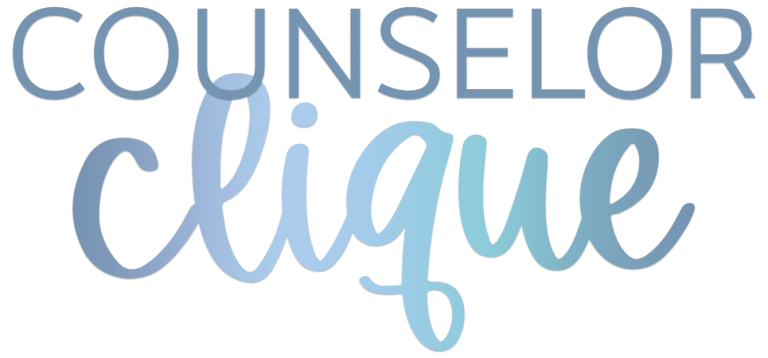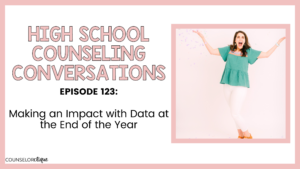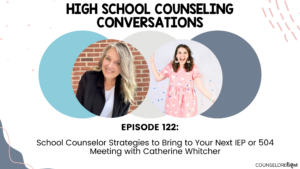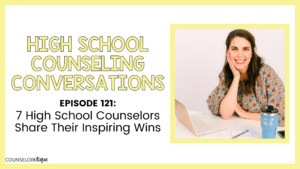
Here's What to Expect In This Episode:
Wouldn’t it be nice to have a community of raving fans for your high school counseling program? You know, those people who are not only aware of the amazing work you’re doing but also actively support and advocate for your program.
We all know how tiring it can be to constantly advocate for our programs, so let’s explore how we can transform those around us into raving fans who reinforce our efforts. We’ll start by focusing on the people who are already in front of us, such as students, teachers, administrators, and parents. I’ll share how to become more visible to them, how to build trust with them, and more.
PS: The 100th episode of High School Counseling Conversations is coming up soon! Submit your questions for this special “Ask me Anything” episode by sending me a DM on Instagram @counselorclique or an email to [email protected]. Nothing is off limits!
Topics Covered in This Episode:
- Simple ways that you can become visible at your school
- How to ensure that students and parents know where your office is
- Putting yourself out there and getting into classrooms for lessons
- Asking for valuable feedback as a way to create raving fans
- What to do if you get negative feedback
- Inviting key people into your advisory council meetings
Resources Mentioned in This Episode:
- Join the Clique Collaborative
- Classroom Lessons Classroom Playlist
- High School Counselor Kickstart Course
- Podcast: Episode 83, How to Use Needs Assessments Strategically This Year in Your High School Counseling Program
- Podcast: Episode 17, 10 Key Stakeholders to Invite to Your School Counseling Advisory Council Meetings – Part 1
- Podcast: Episode 18, 10 Key Stakeholders to Invite to Your School Counseling Advisory Council Meetings – Part 2
- Podcast: Episode 19, Using an Advisory Council to Tell Your Story with Lauren and Vira
- Leave your review for School Counseling Conversations on Apple Podcasts
Other Blog Posts You Might Like:
Read the transcript for this episode:
0:00
We are coming up on episode 100 of High School Counseling Conversations. I know I know I cannot believe it either. It has been a fun journey and a wild ride for sure. For our 100th episode, I’m doing a q&a episode, an ask me anything episode. So I want you to stop what you’re doing. Open up your Instagram and send me a DM with your question for the 100th episode.
0:24
Or if you’ve got your email open, open up an email, email me [email protected] with your question, how do we make this as easy as possible for you. I will link both of those in the show notes. So what can you ask questions about you can ask questions about the podcast past or future guests. Topics we’ve covered topics we haven’t covered personal things podcast journey questions, baby questions.
0:46
Wait, you already know I’m having a baby right in January? Parenting, marriage, High School Counseling issues you’re having, nothing’s off limits. So go ahead and submit your questions for the 100th episode today so that we make sure it airs in episode come mid November.
1:02
Now to today’s episode, how do you create raving fans for your school counseling program so that you don’t always have to be the squeaky wheel when you’re talking about advocacy all the time. Because I know you get tired of it. You know what you do. You know the amazing things that you’re already putting out into the high school world for students and their families.
1:22
But why don’t other people seem to notice it or to see it? What’s the point of continuing on this advocacy train if no one else seems to notice or care. I want to talk a little in this week’s episode about how you can transform the people who are already in front of you, your partners in your school and in your community into raving fans so that you have reinforcements for your advocacy efforts. Because whether you’re on a team or you’re doing the thing solo, you do not need to go at this part all alone.
1:57
You got into this profession to make a difference in your students lives. But you’re spread thin by all the things that keep getting added to your to do list. I can’t create more hours in the day, but I can’t invite you into my counselor click where you’ll finally catch your breath. Come with me as we unpack creative ideas and effective strategies that will help you be the counselor who leaves a lifelong impact on your students. I’m Lauren tingle your high school counseling hype girl here to help you energize your school counseling program and remind you of how much you love your job.
2:30
So I first heard about the term raving fans from the Chick fil A World my father in law is a Chick fil A store operator and so I’ve just done a lot of listening to podcasts on their business model and how they treat their customers. Another company I’ve heard emulate a lot of that same raving fan language is a school Fundraising Company called boosterthon.
2:51
I’m sure the concept of raving fans has been adopted by tons of other companies, businesses, workplaces and organizations that want to elevate their customer service or their customer experience for their people. For the sake of this episode, I am going to talk about our high school counseling partners as our customers. These could be students, parents, teachers, administrators, community members, anyone who could be reached by our program. That’s what we’re talking about.
3:18
When we elevate the customer or partner experience and we humble ourselves in the process, we’re naturally going to think of how we can make their experience better. And while we’re busy plowing forward with our next deadline, because we know there are a lot of those, the next will counseling event the next data point to collect, I want us to pause and think of these three ways that you can create raving fans out of your people so that they can help you do the advocacy work that you’ve always been wanting to do.
3:47
So let’s start small. Let’s start with the people who are already in front of you. And maybe this is obvious, and I did not need to state this to you. But people are noticing you in your role in the school whether you want them to or not. For example, when I asked my kindergarten daughter if she had met the school counselor in her school yet at the beginning of the school year, I kept waiting for her to tell me that the counselor had already come in and done a lesson in the classroom and, you know, told her about her role or something.
4:12
And the first thing she noticed was that the counselor was in the cafeteria helping students. She already saw this person as a helper before she was ever formally introduced to her in a classroom lesson setting. An administrator had already pointed out the counselor’s office to us on a school tour. And so she saw it there and then her teacher had already mentioned that they would meet the counselor in an upcoming week as they walked by the counselor’s office on their way to the gym.
4:36
These little touch points came from people other than the counselor. Other people in the school community and this will happen in your school too. So what are ways that you can be visible if you feel a) invisible or b) like you’re drowning and you can’t come up for air to think about something that feels frivolous or long term out there like visibility and advocacy.
4:59
Start with The people who are in front of you, your students and your teachers, be visible with your students. How can your students cheer you on and use your resources if they don’t know who you are? It starts at the beginning of the year, the beginning of a quarter, the beginning of a semester.
5:14
One of the great things of working in a school is that you get that fresh start all the time. I take that into my real life, too. I feel like I still talk in semesters, it’s the beginning of a new semester, and it’s just a part of the year. Whether those are new students coming into the school, or the new quarters or semesters or years restarting, you get another chance to reinvent yourself or your school counseling program all the time. So don’t take it for granted.
5:39
Do students and parents and people in your school know where your office is? Stand outside your office in the mornings or between class changes. Think of when there’s a lot of foot traffic outside your office or your lobby and plant yourself out there during that time. If you want to grab another co-counselor go out together do that. It’s a nice break for you to stand up from your desk. If you’ve been working on something at your computer or just take a little social break and chat with some people, including your co workers.
6:06
You can greet students, you can ask them questions and most certainly, they’ll see you and ask you questions just because seeing you reminds them that they had something to ask you. If they haven’t gotten a chance to visit your office yet, or ever consider doing a video tour of the counseling offices or an introductory video that your teachers can show your students, you can use that same video at the beginning of the school year and the beginning of second semester. Or you can create one whenever you want just for fun.
6:32
Sometimes this is easier to create and share out versus physically going and getting in front of every classroom and every student just to say the same thing over and over again. Multiply yourself and work smarter in this way. If you haven’t put yourself out there yet to teachers to get into their classrooms to do a lesson or two, now is the time I’ll link to a podcast playlist of classroom lesson episodes for you for some more inspiration in this arena.
6:57
Teachers are going to get on board with you if they trust what you’re doing is valuable. So let them be in the classroom while you’re doing your thing for a little bit when they see what you’re all about. And that you’re equipping the students with some resources to make their students more independent and ready to be functioning young adults in society, they’re going to be so thankful for that role that you play in the school. And nothing is more valuable than a teacher singing your praises to other teachers in the teacher work room or over lunch right?
7:25
Go to counselorclique.com/classroomplaylist to get some more ideas for visibility and advocacy towards your teachers through classroom lessons. When your students and teachers know who you are and have experience with what you do, they’re going to share about that with others who are in their circles. Advocacy work will start being done passively without you even having to lift a finger and that sounds pretty good to me.
7:52
You nailed your interview secured your dream job. What the heck do you do next? How do you know where to go from here? Imagine reducing you’re overwhelmed with a guide that takes you through the step by step process of what needs to happen after you get the job. You don’t deserve to waste your energy spinning your wheels every different direction.
8:10
You’ve got other things to get to. Get the support you need to start your new role with confidence and clarity. Introducing the high school counselor kickstart course. This eight episode private podcast will help you navigate the early years of your high school counseling career with confidence.
8:26
In addition to the exclusive podcast episodes, you’ll get episode transcripts, a workbook, a PD certificate and two incredible bonuses that you don’t want to miss a high school counseling curriculum map and a sample needs assessment. Consider this your comprehensive survival kit for your beginning years as a high school counselor. Join us Inside the high school counselor kickstart course by going to counselorclique.com/newcounselor today.
8:52
Another way to create raving fans is to ask for feedback. So assure all of your partners that you really want to know what they think they might think that their opinion isn’t important or won’t be validated. But this is what changes a regular perception into a raving fan perception. They know that their feedback is going to be heard and going to be valued, but you have to assure them of that and let them trust you by actually doing something with it.
9:18
Feedback can come in the form of your needs assessment or other places where you ask for feedback like after an event like a career fair. So for something like this, think about the feedback that you could get from students, teachers and the career fair participants themselves who came into your school from the local community.
9:34
Here’s your warning though. It’s really easy to only hear negative feedback or have all of your mortal enemies show up to really tell you what they think when you are considering receiving feedback from all of these parties. There will always be people who are disappointed or misunderstood what you were trying to accomplish. But listen, hear me out. This is helpful though.
9:57
Think about it. If someone didn’t know about an event where they Have a complaint with how information was delivered, or they didn’t like how it was facilitated during the school day, you get to sit down and dig deeper as to why this was the case. Maybe it’s just because they don’t like you. Yeah, that could happen. And maybe they just want something to complain about, you’re gonna have those people.
10:15
That person is not your raving fan. And they may certainly never be someone who turns into a raving fan, we might need to cut those losses, you are not for everyone. But if someone has a misunderstanding, or a valid piece of feedback that you could take and implement a change from, it’s really important that you get to hear that. The risk in asking for feedback is exactly that. It’s just scary. It’s uncertain. What if they hated this opportunity that you just put out there and now is their chance to let you know exactly how they feel?
10:46
Well, if they hated something you did, for fair reasons, now, you don’t have to do it anymore. It’s gonna come off your plate and you’re not wasting your time by doing it again. You’re sitting here listening to me thinking, Okay, you just think about everything really positively. That is probably true. But I do think feedback from trusted sources can do wonders for your program.
11:05
Please don’t hear me telling you to be gaslit by every piece of quote, feedback. That is exactly what you need to hear. Remember, when I mentioned your mortal enemies? If you have them lurking out there, they are so excited to fill out your feedback form, just as excited as your raving fans to tell you what they hated instead of what they loved. They’re like polar opposites on the spectrum. So put on your big girl panties and get ready for it have some thick skin. I know I equally hate it as much as I love it.
11:32
Think Critically, when you’re putting out your needs assessment to consider the questions you’re asking and the types of answers that you’re soliciting. I did a past episode on needs assessments that I recommend you go back and listen to if you want a little bit more there. I also did a teaching on needs assessments inside the clique collaborative High School Counseling membership. That podcast episode can be found linked in the show notes. And you can always join us inside the clique collaborative membership or learn more about it by going to cliquecollab.com.
12:04
Once you get some feedback from a needs assessment, a post event survey or an end of year survey, funnel that feedback back through your annual goals. Look at it with a critical lens by yourself. And then look at it with a critical lens with your team. Highlight the things worth discussing the good and the bad. I want you to hear all of the feedback possible, but you won’t be able to do something with all of it immediately.
12:24
So funneling that back through your two or three annual SMART goals is how you’re going to determine what’s up next on your docket, file it away where you can look at it again, maybe in your end of year round up as you’re thinking about your goals for next year.
12:38
The last way, and probably the most valuable way I want you to consider creating raving fans out of your partners is to invite key people into your advisory council meetings.
12:49
Now, here’s the thing. I love talking about advisory councils because I know how powerful of a tool they can be. But I find that people are in two camps here. Either they agree with me or they think this is a really boring topic because they don’t have an advisory council. And they don’t feel like they have the capacity to take it on. So let me repeat to you whether you have a school counseling advisory council right now or not, this is a key piece of turning your school partners into absolute raving fans.
13:15
This small group experience I’m calling an advisory council is like a small group of people gathering together. It’s intimate and it’s intentional. You invite specific people here with a purpose. And my hope is that in this space, people know that their feedback is the most valuable. You have people who you trust in the room who can share the good and the bad, and then you can process it with them.
13:38
I think there’s a lot to say about hearing feedback from someone who you really do value, what they think about something. You can also hear the words from their mouths directly instead of like a feedback form. And you can assure them that you’re doing things with the feedback that they’re receiving. So remember when I said they might not share feedback in general, because they don’t think it’s actually going to be valued. You get to face to face, tell them it is going to be valued and here’s what we’re doing with it.
14:05
And listen, this is not an all the time thing. You don’t have to have advisory councils every week or every month. This is to max three times per school year. And the payback that you get on the back end is worth its weight in gold. If you’re wondering who should be in the room where this happens, head back to episodes 17 and 18 of the podcast to hear about 10 people that I think you cannot hold an advisory council without.
14:28
Your advisory council members will become your biggest raving fans and they in turn will become your mouthpiece around the school and the community for the amazing things you’re doing as a high school counselor. Those key people will have a ripple effect spreading far and wide into all of their corners about the work that you’re doing. If you don’t believe me on this one, take Vira and Lauren’s word for it back in episode 19.
14:51
I shared their story about how their advisory council became their strongest tool for shaping the way their school counseling story is told in and around their school. There podcast listeners just like you. So I know that you’re gonna love that episode.
15:04
I hope this episode was helpful and considering how to best serve your students, families and community that your high school counseling program is centered within. Remember to start where you are remember to ask for feedback and invite the key people that you need to to your advisory council meetings and to actually have those meetings.
15:22
I know I mentioned a bunch of links and past podcast episodes just here in this podcast. So as a reminder, all of those are linked in the show notes for you to easily get to if there’s something that tickles your fancy that you want to go back and read or listen to. So I hope you enjoyed this episode. I’ll see you next week.
15:39
Thanks for listening to today’s episode of high school counseling conversations. All the links I talked about today can be found in the show notes and also at counselorclique.com/podcast. Be sure to hit follow wherever you listen to your podcast so that you never miss a new episode. Connect with me over on Instagram. Feel free to send me a DM @counselorclique. That’s C-L-I-Q-U-E. I’ll see you next week.
Connect with Lauren:
Cheers + Happy Listening!
Like what you’re hearing? Follow and leave a review on Apple Podcasts. It helps other high school counseling friends find it!
Can’t contain your excitement? Share the pod! Tell a friend! Your word-of-mouth referrals mean the world to me!






